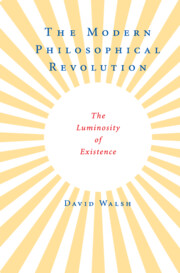Book contents
- Frontmatter
- Contents
- Preface
- Introduction
- 1 Kant's “Copernican Revolution” as Existential
- 2 Hegel's Inauguration of the Language of Existence
- 3 Schelling on the Beyond of Existence
- 4 Nietzsche: Philosophy as Existence
- 5 Heidegger's Achievement Despite the Betrayal of Philosophical Existence
- 6 Existence Without Refuge as the Response of Levinas
- 7 Derrida's Dissemination of Existence as Différance
- 8 Kierkegaard's Prioritization of Existence over Philosophy
- Epilogue: Modernity as Responsibility
- Works Cited
- Select Bibliography of Secondary Sources
- Index
7 - Derrida's Dissemination of Existence as Différance
Published online by Cambridge University Press: 05 June 2012
- Frontmatter
- Contents
- Preface
- Introduction
- 1 Kant's “Copernican Revolution” as Existential
- 2 Hegel's Inauguration of the Language of Existence
- 3 Schelling on the Beyond of Existence
- 4 Nietzsche: Philosophy as Existence
- 5 Heidegger's Achievement Despite the Betrayal of Philosophical Existence
- 6 Existence Without Refuge as the Response of Levinas
- 7 Derrida's Dissemination of Existence as Différance
- 8 Kierkegaard's Prioritization of Existence over Philosophy
- Epilogue: Modernity as Responsibility
- Works Cited
- Select Bibliography of Secondary Sources
- Index
Summary
Levinas completed the prioritization of practical reason that began with Kant, but it was Derrida who unfolded the profusion of theoretical consequences. It was Derrida who saw the full significance of the philosophical revolution that Levinas had made irreversible. In this sense Derrida represents the culmination of the movement we have been following, especially with respect to the correction of its tragic self-betrayal in Heidegger. Derrida was thus more like Hegel in inaugurating a new mode of philosophy, or rather in giving shape to the new mode of philosophy that has emerged in our time. Of course, he was utterly opposed to the systematizing proclivities of Hegel, whom he excoriated in his famous Glas, but he occupied a similar position in uniting a bewildering array of developments hitherto apprehended only in isolation. Derrida held together in life what Hegel had also seen as an existential unity despite his inclination toward conceptualization. It is the definitive rejection of the temptation toward theoretical coherence that marks the achievement of Jacques Derrida and at the same time marks the incoherence of his deconstruction philosophy. He resumed the project of German idealism, which had set itself the task of integrating the Kantian bifurcation of theoretical and practical reason. What had now become clear was that the integration could never be accomplished theoretically. Schelling, that most neglected voice in the whole conversation, was after all right. Theory cannot comprehend that by which it is comprehended; the priority of practice includes the practice of theory itself.
- Type
- Chapter
- Information
- The Modern Philosophical RevolutionThe Luminosity of Existence, pp. 335 - 390Publisher: Cambridge University PressPrint publication year: 2008



